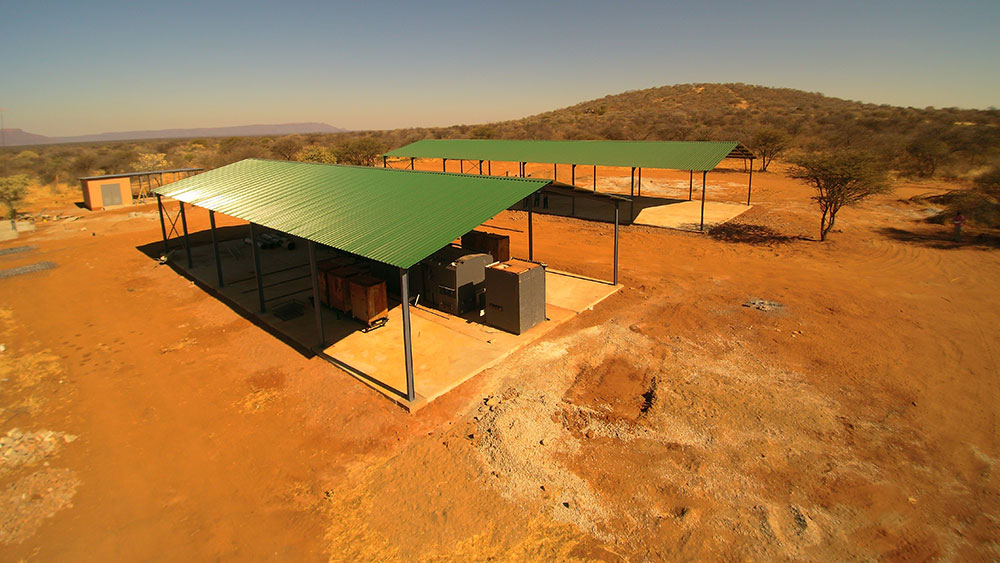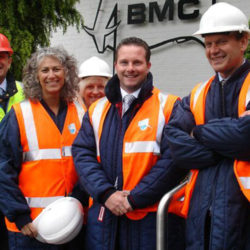Biomass Technology Demonstration Centre
-

- by CCF Staff January 15, 2017

The Cheetah Conservation Fund (CCF) has completed initial construction of a new facility at its main campus, called the Biomass Technology Demonstration Centre (BTDC). The primary objective of this ambitious project is to catalyze the biomass industry within Namibia. With up to 15 tons per hectare of invasive thorn bush, central Namibia is an ideal location to demonstrate the full economic potential of biomass related industries and to research sustainable harvest methods that ultimately restore habitat. Bringing commercial enterprises to central Namibia will have the combined benefits of creating much needed employment, generating electricity, restoring wildlife habitat and improving farmland productivity.
Research & Validate
The BTDC will research a wide range of biomass technologies with an emphasis on those that are capable of generating sustained economic enterprises. Initial technology will include manufacturing of briquette logs, charcoal hex logs, lump charcoal, and for pyrolysis-based electrical generation. Phase two will include other promising technology such as wood pellet production, alternative chipping power trains, and Stirling engines.
The BTDC will draw on academics, researchers, and engineers to implement, evaluate and validate each technology, determining its suitability for the type of biomass available in the region. As needed, equipment and processes will be customized. Evaluations will also be made on the overall economic potential of specific industries to assure that cost of production is low enough to result in profitable sales of end products.
Over the past decade CCF has been a leading researcher in the area of thorn bush harvest methods in Namibia. Its Bushblok operation has been certified by the internationally recognized The Forest Stewardship Council (FSC)™ (FSC-C004580). Researchers conduct long-term monitoring of harvested areas to provide detailed information on habitat recovery. The BTDC will continue this level of in-depth excellence, evaluating new harvest machinery and methods. Worker safety and habitat restoration will continue to be emphasized, and the centre will also focus on investigating how harvest methods can be efficiently and cost-effectively scaled. Commercial biomass operations will need large quantities of wood chip delivered at predictable intervals throughout the year, so matching input needs to harvesting equipment, methods and transportation will be vital.
Other forms of renewable energy technologies will also be evaluated at the BTDC. This will include photo voltaic (solar) systems, alternative battery and energy storage systems, and micro-grid deployments. As biomass industries expand in central Namibia, the absence of electrical power will be a barrier to success for many villages. It is likely that biomass based electricity and solar electricity will both be important sources of energy for rural biomass industry, so the BTDC will investigate how to best implement small grids in rural areas.
With a wide range of installed operating equipment, tuned methods of operation, and a detailed understanding of cost economics and wood harvest methods, the BTDC will be the ideal location to demonstrate biomass technologies. The centre will attract entrepreneurs, existing companies, international grant foundations, NGOs, and investors from all over the world. By connecting investment capital to businesses and sharing knowledge the BTDC hopes to catalyze a new growth of biomass industry in central Namibia. With millions of hectares of invasive bush, biomass will become a regional economic powerhouse, creating much needed jobs, new tax revenue, and improving livelihoods.
Train & Educate
The final role of the BTDC will be education and training. The production floor and nearby classrooms at the CCF will be used train workers on equipment operation, safety procedures, use of personal protective equipment, employment law and other topics. Live field training will cover important topics for planning a harvest, safety in the environment, harvest equipment operation, and implementation of FSC-compliant methods. Community based businesses and entrepreneurs will receive additional education on the economics of biomass businesses, distribution/transportation alternatives, and access to local and international capital. Additionally, the BTDC will welcome international and Namibia academic institutions for student education and as a base for continued research.
Summary
The potential is huge. With millions of tons of available biomass located in a region with excessive unemployment and little electricity, no other idea could have such an impact on central Namibia. The Cheetah Conservation Fund has studied the local habitat for over a decade and believes that a sustainable, responsible harvest of invasive thorn bush is not only possible, but desirable. CCF is coordinating international donors and investors to fund and support the Biomass Technology Demonstration Centre. Through continued research, demonstration of related technology and training, they hope to catalyze a new wave economic activity within central Namibia centered on biomass.
Related Reading
-
November 5, 2021
Climate Change and Cheetahs -
September 5, 2012
Chipping Away at Bush Encroachment -
July 23, 2005
Beef and Bushbloks



